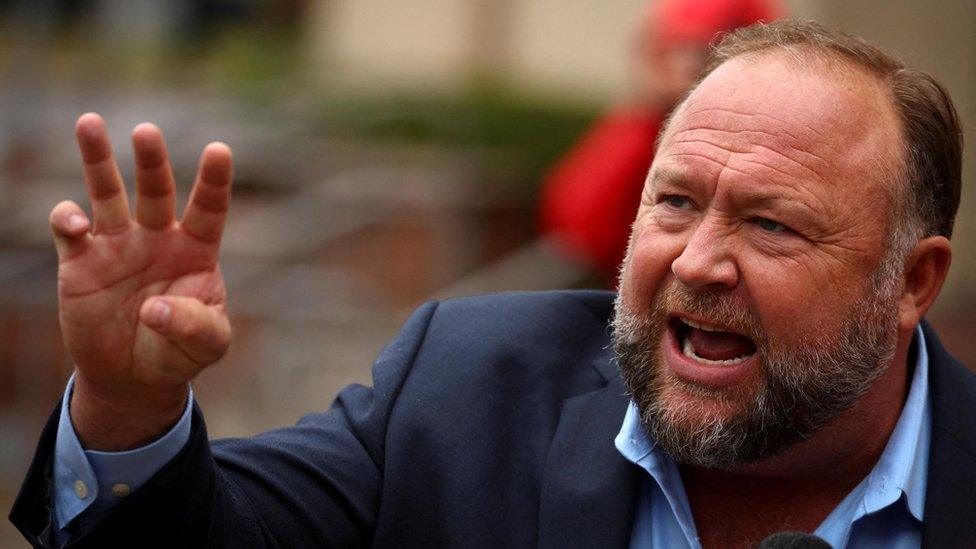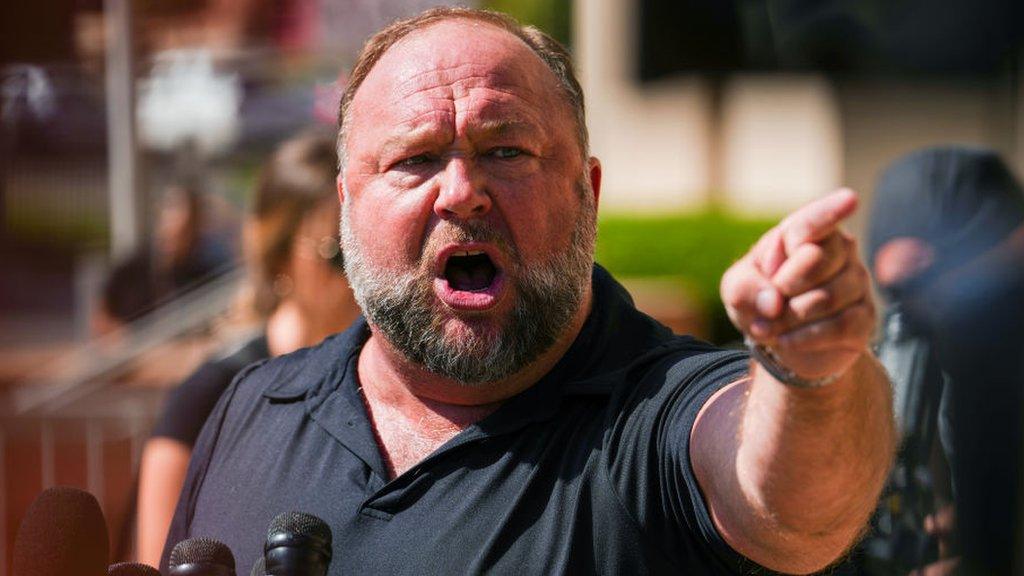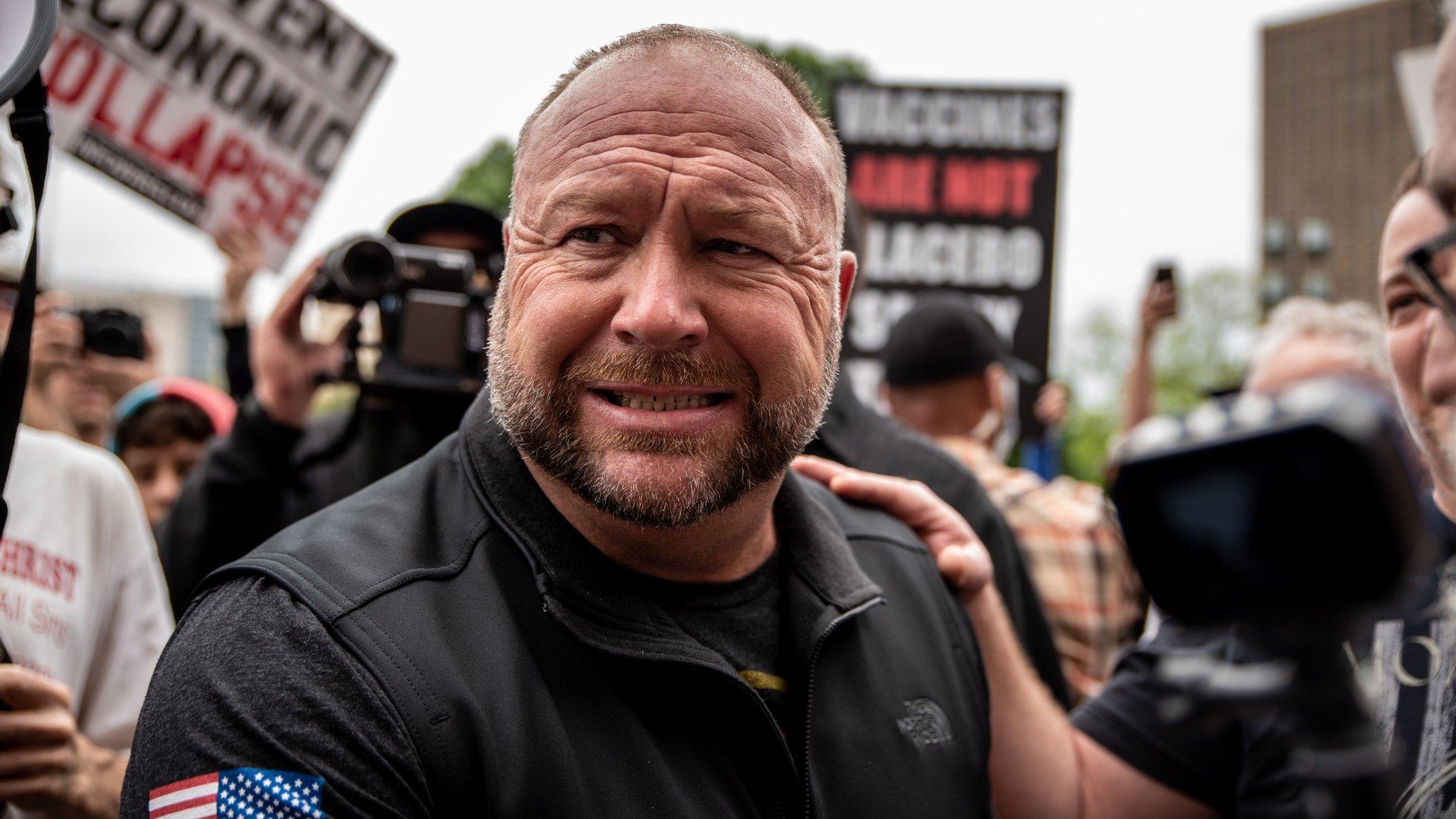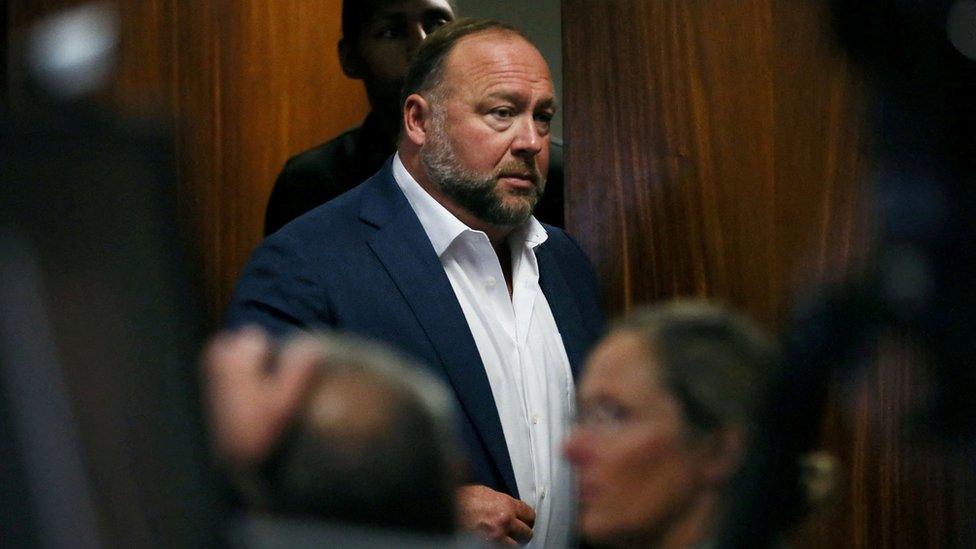Alex Jones told to pay $965m damages to Sandy Hook victims' families
- Published

Alex Jones now acknowledges that the Sandy Hook shooting was "100% real"
Conspiracy theorist Alex Jones has been ordered to pay $965m (£869m) in damages after falsely claiming the 2012 Sandy Hook school shooting was a hoax.
The families of eight victims, and an FBI agent who responded to the attack, had sought at least $550m in the defamation trial in Connecticut.
They alleged the right-wing radio host's misinformation led to a decade of harassment and death threats.
Twenty children and six adults were killed at Sandy Hook Elementary School.
Jones, who founded the conspiracy-laden Infowars website and talk show, argued for years that the massacre was a "staged" government plot to take guns from Americans and that "no-one died".
He called the parents of victims "crisis actors" and argued that some of them never actually existed.
He now acknowledges the attack was "100% real", a concession he made in August at a separate defamation trial in Texas.
As the verdict was read out on Wednesday in Waterbury, Connecticut - some 20 miles (32 km) from the site of the 2012 shooting - many of the families were visibly emotional with some in tears.
The three-week trial was marked by emotional testimony from a succession of parents.
Some described receiving a deluge of online hate and others said they had to move homes repeatedly for their own safety. A father, Mark Barden, recounted hearing that people were desecrating his son Daniel's grave by "urinating on it and threatening to dig it up".
Jurors also heard evidence that Jones and his company, Free Speech Systems, made millions of dollars selling nutritional supplements, survival gear and other products on the Infowars catalogue.
Jones broadcast himself watching Wednesday's verdict and scoffing at the court proceedings. He also appealed to his followers to make urgent donations, and pledged that the funds would not go towards his legal costs.
"The money does not go to these people," he said. "It goes to fight this fraud and it goes to stabilise the company."
His lawyer Norm Pattis told reporters that they will appeal the decision.
"Candidly, from start to finish, the fix was in in this case," he said outside the court.
BACKGROUND: Sandy Hook: What happened that day
LEGAL CASE: Sandy Hook parents sue for defamation
In closing arguments, plaintiffs' attorney Chris Mattei said: "When every single one of these families were drowning in grief, Alex Jones put his foot right on top of them."
Jones, for his part, had slammed the proceedings as a "show trial" run by a "tyrant" judge and argued he was not to blame for the actions of his followers.
"I've already said I'm sorry hundreds of times, and I'm done saying I'm sorry," he said in dramatic testimony late last month that brought some in the courtroom to tears.
His lawyers urged the six-member jury to ignore political undercurrents in the case and award minimal damages.
His lead defence lawyer, Mr Pattis, also drew a stern rebuke from the judge after he accused the opposing legal team of "inventing anger".

Ruling sets a huge precedent

This marks a moment of reckoning when it comes to harmful online conspiracies. Jones has never been handed damages of this scale before, nor has any other conspiracy theorist - and it sets a huge precedent.
The question everyone is asking now: will this put an end to these kinds of conspiracies and the harm they can cause? That's certainly what the Sandy Hook parents hope.
A former Infowars insider tells me that he thinks this could be the beginning of the end for Jones and put a stop to him pushing theories.
But, after the pandemic, there's an increasing group of people vulnerable to the tactics and rhetoric used by a conspiracy theorist like him. Jones is already attempting to claim this verdict is just more proof that people are trying to stop him telling the truth. The bereaved families who were in court can see it's far from that.
Pandora's box is wide open and it's hard to close. At the very least, this shows the tide is starting to turn. People realise the danger online disinformation can pose - and how dismissing it as fringe does nothing to stop harm caused to the victims. Those victims are turning to the courts, rather than social media sites or policy markers, for justice.

The trial follows a similar case in Texas in August that saw Jones ordered to pay $49.3m in damages to other Sandy Hook parents.
The plaintiffs - who said they had endured harassment and emotional distress because of the Infowars founder's misinformation - had sought $150m.
A lawyer in the Connecticut case said families should receive at least $550m, saying Jones's Sandy Hook content got an estimated 550 million views from 2012 to 2018.
But the jury ultimately made 15 separate awards, ranging from $28m to $120m, totalling $965m.
It said these were to cover emotional distress as well as slander and defamation. It is possible Jones will be separately told to pay punitive damages.
Sandy Hook dad: Trolls said I killed and dismembered my son
However, it is unclear how much money the families will actually receive, with Jones saying on Wednesday there "ain't no money".
He and his company have filed for bankruptcy protection in Texas, where a forensic economist has testified that he and his company are worth around $270m. Jones has disputed that figure.
Jones and his entourage flew to Connecticut from Texas for the trial in a private jet. They stayed in a rented villa with a pool and tennis court, according to the New York Times.
Jones still faces a third defamation trial over the Sandy Hook shooting that begins in Texas later this year.
- Published23 September 2022

- Published6 August 2022

- Published5 August 2022
